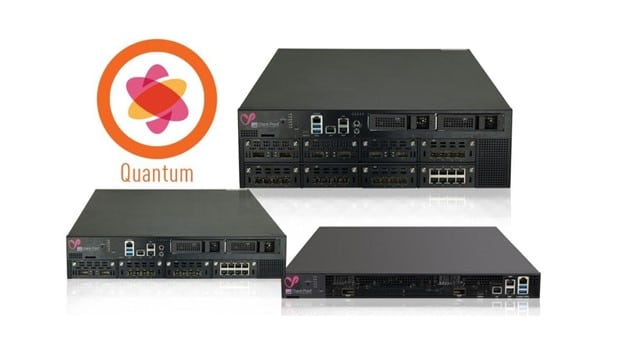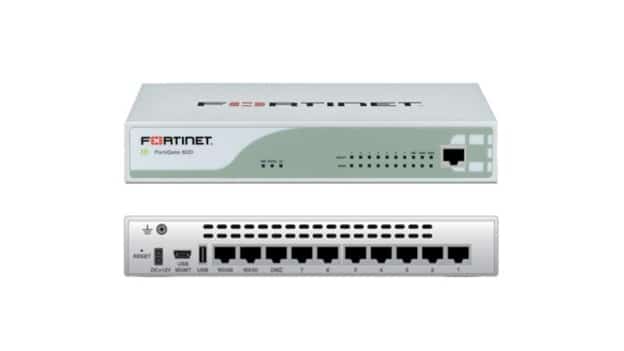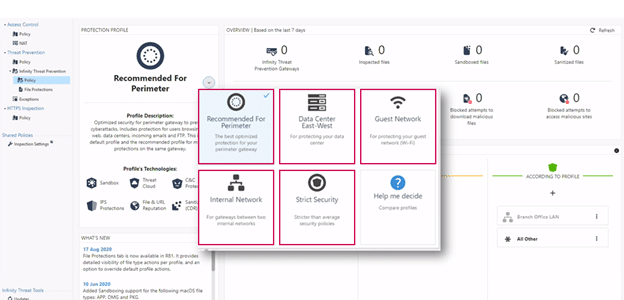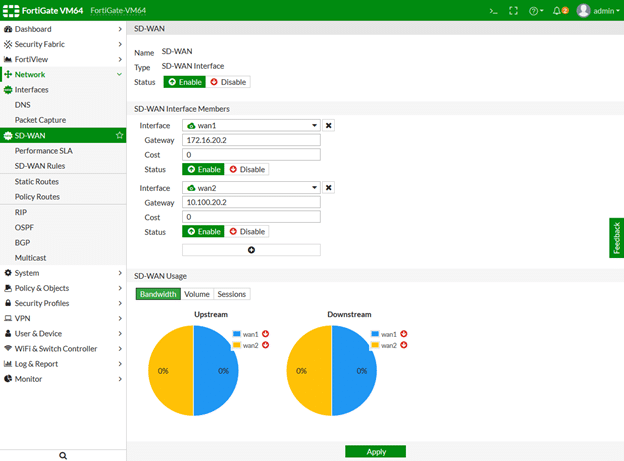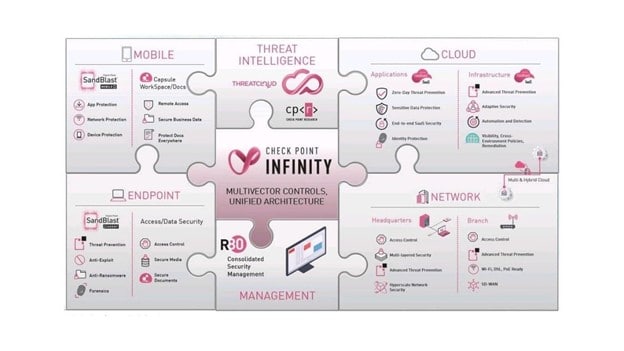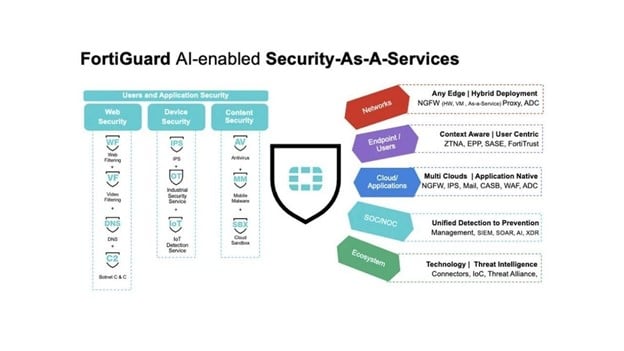
A quick Google search would show that Check Point and Fortinet are two of the top options in the field of next-generation firewalls (NGFW).
These are somewhat comparable products that have received the same 4.5/5 rating on Gartner Peer Insights. They have similarities, but they also have a number of differences.
To choose the better NGFW, it is important to have a meticulous examination of what the two are offering. Comparing and contrasting the highlight features is not going to be enough, though. It is also important to look at the details that may not be obvious.
This review aims to help organizations decide which next-gen firewall to get based on the following main considerations: the security features being offered, management functions, as well as ease of use and efficiency.
Table Of Contents
Quick Brief on Check Point Software Technologies
Established in 1993, Check Point is one of the more established cybersecurity firms. Its very first product was a firewall software called FireWall-1. It later developed one of the pioneering VPN products in the world called VPN-1.
Check Point’s creativity when it comes to naming its products may leave much to be desired, but the cybersecurity expertise it has built over the years cannot be downplayed.
Check Point eventually developed other cybersecurity solutions. Now, its offerings range from endpoint to network, cloud, mobile, and data protection products. These include both hardware and software. It also has security management products.
The company’s main product, however, is its firewalls. In 2021, Check Point gained the recognition of being a Leader in the 2021 Gartner Magic Quadrant for Network Firewalls.
Gartner lauded the company’s security architecture innovations as it offers a comprehensive range of on-premise, cloud, and hybrid network solutions.
Quick Brief on Fortinet
An American multinational company based in California, Fortinet is a provider of enterprise security solutions. It was founded in 2000 by the billionaire Ken Xie, who is also the founder of Systems Integration Solutions (SIS) and NetScreen.
Just like Check Point, Fortinet also had a firewall as its first product. Now, it offers several other cybersecurity solutions including hardware and software products. These include network security, cloud security, zero trust access, security-as-a-service, and a host of networking and communications products.
Fortinet was once listed as the seventh-best company for network security hardware by CRN Magazine.
In 2010, it became the biggest player in the unified threat management market as it cornered the highest annual revenue, at $324 million, among other similar cybersecurity providers.
Comparing the Two Next Generation Firewalls
As mentioned, Check Point and Fortinet have multiple security products, but this review focuses on their next-generation firewall products. Here’s a rundown of what the two companies’ headline security solutions are offering.
Check Point NGFW Explained
Check Point’s next-gen firewall is designed to be capable of preventing fifth-generation cyber-attacks. It features innovative security technologies that ensure more than decent protection. It employs the exclusive Quantum Security Gateway tech built according to the Infinity Architecture.
Below is a summary of the highlight features and functions of Check Point’s NGFW.
- Ability to handle up to 1.5Tbps of traffic
- On-demand scalability
- Centralized approach to threat management
- In-line configuration that significantly makes it non-interruptive
- Signature-based IPS engine baked into the system
- Virtual private network function
- Network address translation
- Serial peripheral interface
- App awareness and control
- Machine identity awareness that makes it possible for the firewall to integrate with Active Directory
- SSL decryption to ensure that even encrypted traffic is evaluated before it is allowed
- Full-stack security visibility
Fortinet NGFW Explained
Fortinet promises industry-leading enterprise security that enables full security visibility for different IT architecture. It offers threat protection designed for security-driven networks and the ability to easily integrate with hybrid environments.
Here’s a list of its top features.
- Real-time protection through the FortiGuard services
- Speedy end-to-end security
- Automated workflows to facilitate operational efficiency
- Enhanced user experience with security processing units
- SSL inspection to make sure that encrypted malicious traffic is blocked
- Web filtering and IPS
- Automated threat protection with the ability to stop ransomware and command-and-control attacks
- Natively integrated proxy with Zero Trust Network Access (ZTNA)
- High scalability and automation-driven network management
Contrasting Check Point and Fortinet
The next-generation firewalls from Check Point and Fortinet are quite similar. Both emphasize the need for real-time protection, speedy performance, and efficiency. They share a few similar features like SSL inspection and IPS.
However, there are some differences in the two’s degree of performance. While they offer many similar functions, tests would show that one can offer better outcomes than the other.
IN terms of visibility, for instance, Check Point shows the superior ability to spot high-risk applications and shadow IT activities. Check Point’s NGFW can detect more than 9,000 suspicious or potentially risky applications. In comparison, Fortinet manages to detect less than 4,156 dubious applications.
Check Point also promises a clearer view of security threats. It is designed to make it easier for organizations to monitor threats and spot them so that the appropriate solutions are implemented as soon as possible.
Moreover, Check Point is slightly better in terms of preemptive protection. Its next-gen firewall ascertains that users only get sanitized or safe versions of files. Fortinet can do the same but only in “proxy mode,” which has the drawback of having a considerable adverse impact on performance. Also, original files may only be stored if the user has an additional on-premise appliance.
Organizations that give considerable weight over efficient management may also favor Check Point slightly with its somewhat minimalist approach to its user interface. Find more details on this in the management capabilities discussion below.
Security Features and Functions Compared
When it comes to security, Check Point and Fortinet have comparable methods and mechanisms in ensuring security. The security features and functions can be summed up as follows.
Check Point NGFW Security Features Breakdown
Check Point focuses more on prevention than mitigation. As such, it provides these features.
- Full traffic inspection, everything is examined including encrypted traffic
- SSL decryption to catch malicious encrypted apps
- Security over performance prioritization
- Preemptive defenses to ensure that only safe files reach users
- Reliable intrusion prevention system (IPS)
- Change management function
- Low vulnerabilities detected in the software
- Good track record in securing networks from top vulnerabilities
Fortinet NGFW Security Features Breakdown
Fortinet’s NGFW is a more than decent choice in having protection against exploits, ransomware, encrypted malware, botnets, and other web traffic-based cyber attacks. It stands out with the following security features.
- End-to-end security and real-time defense with FortiGuard Services
- SSL and TLS inspection
- Efficient web filtering
- Good intrusion prevention system
- DNS security services
- Automated threat protection
The Verdict on Security Features
Certainly, a listing of features is not going to be enough to determine the better option between the two. This is the reason for this comparison – to present details most organizations are unlikely to have access to.
Vendor web pages and security advisories would show that Check Point has the edge of having mature software code. Its next-generation firewall code only logged a total of 24 vulnerabilities for the period 2018 to 2020 or an average of 8 vulnerabilities per year.
In contrast, Fortinet recorded 312 vulnerabilities for the same period or an average of 104 per year. That is significantly higher than what was found in Check Point’s product. However, it does not mean that the latter is not reliable. Fortinet’s number of software vulnerabilities are comparable to those of Cisco and Palo Alto’s firewall offerings.
When talking about the security vs performance compromise, Check Point and Fortinet appear to be doing similar approaches. Both are doing thorough traffic scrutiny including inspection with SSL/TLS. They also similarly provide real-time protection.
However, when dealing with the top 25 high-profile vulnerabilities (as listed by NSA’s October 20, 2020 alert advisory), Check Point shows a better track record. The company’s next-gen firewall has demonstrated the ability to identify and block 100 percent of the top 25 vulnerabilities in four different testing times conducted on October 20, November 20, December 10, and December 15, 2020.
Fortinet only managed to score 88 percent during the first test, 92 percent on the second, 6 percent on the third, and finally 100 percent on the fourth. In other words, it took some time for the firewall to update its database and gain the full capability to detect and block high-profile vulnerabilities. It was also flagged by the US, UK, and Australian cybersecurity agencies for vulnerabilities exploited by Iran.
Fortinet is by no means not a good next-gen firewall, but Check Point has some edge over it in the security aspect. It has significantly fewer vulnerabilities and greater reliability in blocking new vulnerabilities.
Comparing and Differentiating Management Capabilities
The rise of artificial intelligence and machine learning has made modern firewalls considerably smarter. They have already gained the ability to automatically decide on how dubious traffic should be handled and deal with other related decision points.
However, they cannot be completely allowed to operate under AI and automation. Some degree of human involvement is still required, so it only makes sense to examine the management capabilities of the NGFWs from Check Point and Fortinet.
Check Point Management Performance
Check Point is built to be intuitive and easy to integrate into different scenarios. It features a centralized network security management system to make it easy to oversee its performance and the threats it has managed to block. It is also designed to be easy to configure and have a high level of scalability. Additionally, Check Point’s firewall is designed with a sense of urgency, as it facilitates the efficient handling of threats.
Fortinet Management Performance
Fortinet is made with full visibility and protection in mind. It also comes with a natively integrated proxy and the ability to consolidate and run web filtering, DNS security, and IPS at the same time. It makes it easy to deal with attacks and prevent the lateral spread of attacks through dynamic trust and port-level segmentation. Moreover, it sports automation-driven network management, which is advantageous for the building of large-scale operations.
The Verdict on Management Performance
There’s no doubt that both NGFWs here have excellent management functions. They help ensure efficient management while maintaining vast security visibility. Check Point, in particular, stands out with its unified and centralized security management console
In most other areas, the two next-gen firewalls can go toe-to-toe against each other. Check Point may be the preference for many because of its simplified interface that only has seven menus, hence being faster to get familiar with.
As far as scalability is concerned, there is nothing to criticize in both options. They are all fond of using the term “hyperscale.” Check Point promises “on-demand hyperscale threat prevention performance.” Meanwhile, Fortinet offers “hyperscale security that performs efficiently, with no network impact.” Scaling to meet changing demands should not be a problem for either.
Check Point, however, would likely be more enticing for organizations with its “sense of urgency” design. It enables the faster resolution of vulnerabilities. Based on Check Point’s tests, organizations only take less than a week or an average of 6 days to resolve security concerns. It is noticeably longer for other next-gen firewalls including Fortinet.
Usability and Support Compared
Ease of Use
Both NGFWs from Check Point and Fortinet exhibit a good level of intuitiveness or ease of use. Based on ratings accumulated by Gartner, they have very close or similar scores in terms of ease of deployment, quality of end-user training, and ease of integration through standard APIs and tools. They are also equal in terms of the availability of third-party resources.
However, organizations that want to emphasize scalability and management efficiency may want to consider the lengthier steps involved in using Fortinet. Check Point only has 7 menus for users to get acquainted with while Fortinet has 35. This suggests a faster learning curve for most users and lower time to do security configurations for the former and slightly more time to be familiar with the interface of the latter. Check Point’s NGFW is suitable for the use of seamless concurrent administrators, whereas Fortinet’s product only supports limited collaboration for administrators.
Support
Check Point has a good customer support system, which consists of four channels. These are email, telephone, live chat, and a service ticket system. It also has a resource site customers can use if they want to address issues on their own or while waiting for a response from the Check Point support team.
Fortinet also offers good customer support through multiple channels. It provides email support through a web contact form. Also, it has live chat assistance. Its telephone support includes a toll-free line for customers in the United States. Just like Check Point, it also has how-to guides on its website to help customers who may want to address their concerns without having to contact support.
Both companies are known for providing good customer service. There have been no significant complaints of bad responses to customer calls.
User Community
Neither Check Point nor Fortinet has shared details about the number of their respective users. However, they both have a considerable user base worldwide given their popularity in the field of firewall protection.
Based on the number of pages online that provide support or serve as discussion boards for users, it appears that Check Point has the advantage. Searching for discussion/message boards, forums, tutorials, and other related resources would yield results that favor Check Point. In other words, Check Point likely has a broader or more active user community, which is clearly advantageous.
Final Words
It is safe to say that Check Point and Fortinet’s next-generation firewalls are among the best on the market.
Check Point’s product comes with all the capabilities that allow it to protect networks from attacks at the perimeter level. The centralized dashboard enables great efficiency.
Meanwhile, Fortinet’s next-gen firewall is also an effective and efficient firewall that also tries to reduce the complexities of operating an advanced firewall.
However, different organizations have different needs and preferences. The details presented above should serve as a good guide to finding the right next-generation firewall to use.
Ultimately, it is the organization that decides which is easier to implement and use for them, and only they can decide which one is more effective and efficient for their specific IT environments.
